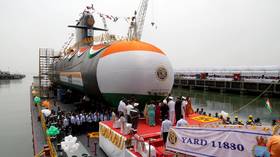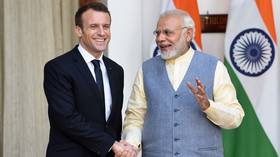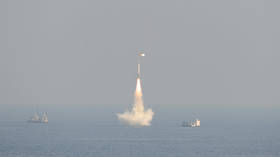Indian giant joins Spanish shipbuilder to bid for mega submarine deal

Indian infrastructure giant Larsen & Toubro (L&T) and Spanish state-owned shipbuilding company Navantia signed an agreement on Monday to jointly submit a bid for the Indian Navy’s prestigious P75 (India) submarine tender, the company said in a statement. The agreement, signed at the Spanish Embassy in New Delhi, stipulates that Navantia will design the submarines based on its S80 class, which was launched in 2021 and is undergoing sea trials before being delivered to the Spanish Navy by the end of this year.
Navantia has also been involved in the design and construction of the Scorpene class of submarines with French defense major Naval Group (previously DCNS), and has worked on Scorpene submarines (Kalvari class) built in India, the statement noted. Commenting on the deal with L&T, Navantia’s vice president of naval construction, Alvarez Blanco, said that the two companies are hoping to cooperate on another Indian Navy project, the Landing Platform Dock program, “whose tender is eagerly awaited.”
The mega P75 (I) project aims to acquire six conventionally-powered attack submarines equipped with air-independent propulsion (AIP) as a replacement for the navy’s Sindhughosh-class submarines. It was initially conceived by the Indian Ministry of Defense (MOD) in 1997. AIP submarines are considered superior to conventional diesel-electric submarines as they allow increased underwater operations from around 48 hours to over two weeks without having to resurface for battery charging.
The P75 (I) program is valued at over 430 billion rupees ($5.26 billion) and requires an Indian bidder to cooperate with a foreign technological partner or an original equipment manufacturer (OEM). The deal will be followed by a 30-year lifecycle contract of a similar value.
The AIP-powered submarine program will be one of the first, and one of the costliest, to be implemented under the MOD’s ambitious strategic partnership acquisition model, approved in 2017 and aimed at boosting the country’s domestic defense manufacturing by involving Indian private sector and foreign defense players ready to share their technologies.
The development comes a month after German submarine builder ThyssenKrupp Marine Systems signed an agreement with India’s Mazagon Dock Shipbuilders to bid for the Project 75 (I) contract.
Last year, several OEMs that had been approved to participate in the tender in 2020 pulled out from the race. The shortlisted companies had included Germany’s ThyssenKrupp, France’s Naval Group, and Spain’s Navantia, as well as Russia’s Rubin Design Bureau ad South Korea’s Daewoo Shipping & Marine Engineering (DSME). The Russian company withdrew from the tender first, followed by the Swedish, German, and French OEMs, which cited unfeasible clauses related to indigenous content and the liability of the foreign technology partner.
Andrey Baranov, deputy director general at Rubin Design Bureau, said at the Army 2022 Expo in Moscow that the requirements in the tender were unrealistic, given that no naval force possesses the kind of vessels sought by the Indian Navy, and that the prototype submarine has to be designed and constructed from scratch, which he claimed is nearly impossible within the given timeframe. Baranov argued that since the submarine would be built in India, the designer would have no control over the process.
Naval Group India country and managing director Laurent Videau said in a statement that “due to certain conditions in the RFP (Request for Proposal), the two strategic partners could not forward the request to us and few other foreign original equipment manufacturers (FOEMs) and thus we have not been able to place an official bid for the project.” He explained that the tender specifications required that the AIP module be sea-proven, which was “not the case” for Naval Group India as the French Navy does not use such a propulsion system.














